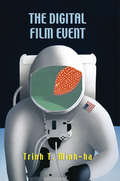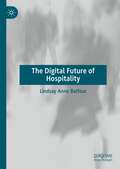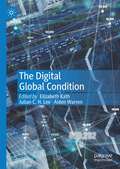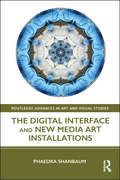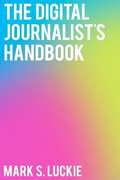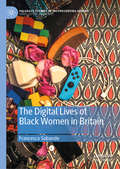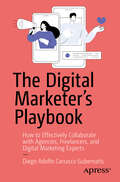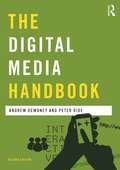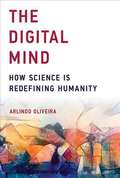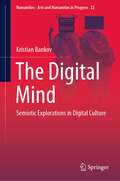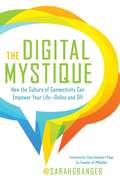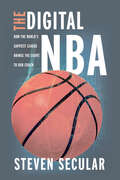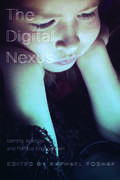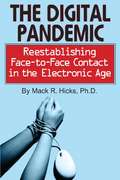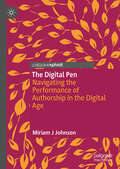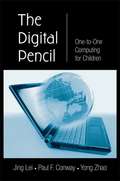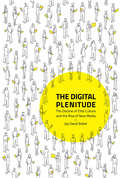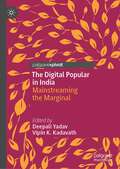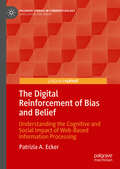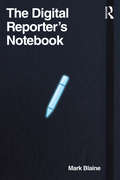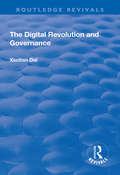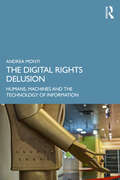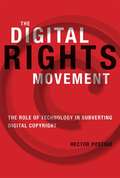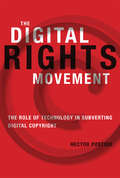- Table View
- List View
The Digital Film Event
by Trinh T. Minh-haEndless travel in cyberspace, virtual reality, and the dream of limitless speed: technology changes our sense of self. In her new book, Trinh Minh-ha explores the way technology transforms our perception of reality. "We are all engaged in social rituals in our daily activities, she writes, "and by remaining unaware of their artistic ritual propensity, we remain 'in conformity'." Her goal, as a thinker and an artist, is to transform our understanding of technology and speed so that we are able to "turn an instrument into a creative tool and to step out of the one-dimensional, technologically servile mind." The paradox that "stillness contains speed within it" is central to Trinh's concept of the digital apparatus. With her signature amalgam of feminism, Eastern philosophy, and practical understanding of filmmaking, Trinh Minh-ha presents a much-needed advance in our concept of the real in a technological age.
The Digital Future of Hospitality
by Lindsay Anne BalfourThis book asks how an unconditional welcome to strangers is both challenged and made possible by new digital technologies, machine learning, and human-computer interaction (HCI). It argues that the digital – the advancement of data, the proliferation of machines (embodied or not) in our homes and on our screens, and the millions of lines of code that organize and predict our lives – is not the absence of hospitality but rather the beginning, though not without its challenges. While such an ethic remains more important than ever, The Digital Future of Hospitality updates this enduring philosophical imperative for digital times. Through the lens of cultural studies, intersectional feminism, and posthumanism, this book reanimates hospitality in relation to a series of digital texts that are relevant to the twenty-first century and beyond – android figures on television, virtual domestic assistants, home- and ride-sharing apps, wearable devices, and a renewed cultural obsession with viruses and immunity.
The Digital Global Condition
by Aiden Warren Julian C. H. Lee Elizabeth KathThis book explores how globalization and ubiquity of digital technology combine to create specific global impacts, challenges and opportunities. Although globalization is already associated with the speeding up of interactions and change, digital globalization is characterized by immediacy. The utter pervasiveness opens new global vulnerabilities at international, national, social and personal levels. The Digital Global Condition examines the nature of digital globalization, enabling us to not only inhabit a digital world, but also to understand it, even to live well in it.
The Digital Interface and New Media Art Installations (Routledge Advances in Art and Visual Studies)
by Phaedra ShanbaumThis book is about the digital interface and its use in interactive new media art installations. It examines the aesthetic aspects of the interface through a theoretical exploration of new media artists, who create, and tactically deploy, digital interfaces in their work in order to question the socio-cultural stakes of a technology that shapes and reshapes relationships between humans and non-humans. In this way, it shows how use of the digital interface provides us with a critical framework for understanding our relationship with technology.
The Digital Is Kid Stuff: Making Creative Laborers for a Precarious Economy
by Josef NguyenHow popular debates about the so-called digital generation mediate anxieties about labor and life in twenty-first-century America &“The children are our future&” goes the adage, a proclamation that simultaneously declares both anxiety as well as hope about youth as the next generation. In The Digital Is Kid Stuff, Josef Nguyen interrogates this ambivalence within discussions about today&’s &“digital generation&” and the future of creativity, an ambivalence that toggles between the techno-pessimism that warns against the harm to children of too much screen time and a techno-utopianism that foresees these &“digital natives&” leading the way to innovation, economic growth, increased democratization, and national prosperity. Nguyen engages cultural histories of childhood, youth, and creativity through chapters that are each anchored to a particular digital media object or practice. Nguyen narrates the developmental arc of a future creative laborer: from a young kid playing the island fictions of Minecraft, to an older child learning do-it-yourself skills while reading Make magazine, to a teenager posting selfies on Instagram, to a young adult creative laborer imagining technological innovations using design fiction. Focusing on the constructions and valorizations of creativity, entrepreneurialism, and technological savvy, Nguyen argues that contemporary culture operates to assuage profound anxieties about—and to defuse valid critiques of—both emerging digital technologies and the precarity of employment for &“creative laborers&” in twenty-first-century neoliberal America.
The Digital Journalist's Handbook
by Mark S. LuckieThe Digital Journalist's Handbook is your guide to the tools you need to know to thrive in today's digital newsroom. This unique how-to book provides simple explanations of complex technologies and provides examples of how journalists can incorporate them into their stories and reporting. The Handbook is composed of 12 chapters, each dedicated to a different tool in the digital journalist's toolbox. Chapters include "Writing for the Web," "Blogging," "Photography," "Audio," "Audio Slideshows," "Video," "Web Design," "Social Networking," "Data Visualization," and "Flash," as well as a glossary with definitions of more than 130 technical terms and phrases commonly used in digital journalism. The Handbook is also fully illustrated and contains diagrams and guidelines of everything from the layout of a typical blog to the features found on a digital audio recorder. In addition, each chapter includes links to online resources, tutorials, and examples of every technology mentioned in the book. The Digital Journalist's Handbook is a must-read for both novice digital journalists and tech-savvy experts.
The Digital Lives of Black Women in Britain (Palgrave Studies in (Re)Presenting Gender)
by Francesca SobandeBased on interviews and archival research, this book explores how media is implicated in Black women’s lives in Britain. From accounts of twentieth-century activism and television representations, to experiences of YouTube and Twitter, Sobande's analysis traverses tensions between digital culture’s communal, counter-cultural and commercial qualities.Chapters 2 and 4 are available open access under a Creative Commons Attribution 4.0 International License via link.springer.com.
The Digital Marketer's Playbook: How to Effectively Collaborate with Agencies, Freelancers, and Digital Marketing Experts
by Diego Adolfo Carrasco GubernatisTransition from traditional marketing to digital marketing and master a comprehensive range of topics within this field. This book offers a practical, step-by-step approach to managing digital marketing (with the help of experts) in the current landscape, making it a timely and valuable resource for marketers, business owners, and students alike. With an emphasis on referential information, you’ll review some of the foundational concepts of digital marketing, including digital assets, advertising channels, formats, and customer awareness. You’ll also delve into targeting methods, audience segmentation, and the use of keywords for display and search ads. Gain insights into key digital marketing metrics like CPC, CPV, CPM, clicks, and CTR, and how they impact campaign performance. Learn about conversion tracking, analytics, and how to interpret digital marketing reports to evaluate campaign success. Explore advanced topics such as the use of artificial intelligence in digital marketing for targeting and content optimization. Understand the landscape of legal, tax, and brand protection in the digital space. The book's relevance stems from the increasing dominance of digital channels in marketing. In today's digital age, understanding and effectively utilizing digital marketing strategies is not just important but essential for businesses and marketers. The shift towards digital has been accelerated by technological advancements and changes in consumer behavior, making digital marketing skills more critical than ever, but not every executive and marketing professional has managed to stay on top of its developments. The Digital Marketer's Playbook is an essential guide for those who have foundational knowledge in marketing but are relatively new to the domain of digital marketing. What You Will Learn See how a digital marketing campaign works (across providers, not provider-specific). Implement campaign optimizations. Explore digital marketing channels, creatives, formats, and advertiser channel providers. Review the wording (jargon) used in the industry (personas, target group, bids, keywords, etc.). Who This Book is For Those who have implemented marketing campaigns, but they are looking to dive deeper into digital marketing, understand it’s particularities and know what to ask for and what to expect from specialists.
The Digital Media Handbook (Media Practice)
by Andrew Dewdney Peter RideThe new edition of The Digital Media Handbook presents an essential guide to the historical and theoretical development of digital media, emphasising cultural continuity alongside technological change, and highlighting the emergence of new forms of communication in contemporary networked culture. Andrew Dewdney and Peter Ride present detailed critical commentary and descriptive historical accounts, as well as a series of interviews from a range of digital media practitioners, including producers, developers, curators and artists. The Digital Media Handbook highlights key concerns of today’s practitioners, analysing how they develop projects, interact and solve problems within the context of networked communication. The Digital Media Handbook includes: Essays on the history and theory of digital media Essays on contemporary issues and debates Interviews with digital media professionals A glossary of technical acronyms and key terms.
The Digital Mind: How Science Is Redefining Humanity
by Arlindo OliveiraHow developments in science and technology may enable the emergence of purely digital minds--intelligent machines equal to or greater in power than the human brain. <P><P> What do computers, cells, and brains have in common? Computers are electronic devices designed by humans; cells are biological entities crafted by evolution; brains are the containers and creators of our minds. But all are, in one way or another, information-processing devices. The power of the human brain is, so far, unequaled by any existing machine or known living being. Over eons of evolution, the brain has enabled us to develop tools and technology to make our lives easier. Our brains have even allowed us to develop computers that are almost as powerful as the human brain itself. In this book, Arlindo Oliveira describes how advances in science and technology could enable us to create digital minds. <P><P> Exponential growth is a pattern built deep into the scheme of life, but technological change now promises to outstrip even evolutionary change. Oliveira describes technological and scientific advances that range from the discovery of laws that control the behavior of the electromagnetic fields to the development of computers. He calls natural selection the ultimate algorithm, discusses genetics and the evolution of the central nervous system, and describes the role that computer imaging has played in understanding and modeling the brain. Having considered the behavior of the unique system that creates a mind, he turns to an unavoidable question: Is the human brain the only system that can host a mind? If digital minds come into existence--and, Oliveira says, it is difficult to argue that they will not--what are the social, legal, and ethical implications? Will digital minds be our partners, or our rivals?
The Digital Mind: Semiotic Explorations in Digital Culture (Numanities - Arts and Humanities in Progress #22)
by Kristian BankovThis book reveals the core features of digital culture, examined by means of semiotic models and theories. It positions commercial and market principles in the center of the digital semiosphere, avoiding the need to force the new cultural reality into the established textualist or pragmatist paradigms. The theoretic insights and case studies presented here argue for new semiotic models of inquiry that include working with big data, user experience and nethnography, along with conventional approaches.The book develops a new concept of identity in the digital age, analyzing the digital flows of recognition and value, which led to the tremendous success of Social Media and the Web 2.0 era. Self-expression, entertainment and consumerism are seen as the major drivers of identity formation in the post-truth era, where the self can no longer be considered independently of a given person’s communication devices, where a substantial part of it is stored and actualized. It will be of interest to semioticians and researchers working on digital culture.
The Digital Mystique
by Sarah GrangerIn The Digital Mystique, Sarah Granger-a nationally recognized expert on online culture and social technology-shows us how digital media is shaping our lives in real time. Whether it's how we raise our children, communicate in love and partnerships, support causes, or establish friendships and trust, Granger pinpoints the best ways to seize digital opportunities to make our lives richer and fuller.While the Internet era is one that is frequently criticized as undermining our health, privacy, concentration, and ability to sustain real-world relationships, Granger takes a more optimistic and empowering view. She shares real-life stories and surprising facts about our lives-both online and off-to shed new and fascinating light on the positive effects of the digital media revolution, showing us how we can personally learn, grow, and thrive by engaging in our digitized world.The Digital Mystique includes the following chapters:Connecting Is Just the Beginning.YOUFriending Is TrendingLove in the Time of MessagingThe Kids Are OnlineThe Senior MomentThe Passion of the WebThere's No Business Like E-BusinessCommunity Is the KeyThe Difference a Tweet MakesWhat We Leave BehindA Stitch in Digital Time
The Digital NBA: How the World's Savviest League Brings the Court to Our Couch (Studies in Sports Media)
by Steven SecularThe National Basketball Association reaches a global audience via a multiplatform strategy that leverages its uncanny ability to connect fans to all things NBA. Steven Secular brings readers inside the league’s global operations and traces the history of the NBA’s approach to sports media from its 1980s embrace of cable through the streaming revolution of the twenty-first century. As fans around the world stream games and other league content, NBA teams incorporate foreign languages and cultures into broadcasts to boost their product’s appeal to audiences in Brazil, China, and beyond. Secular’s analysis reveals how the NBA continues to transform itself into a wildly successful media producer and distributor more akin to a streaming studio than the sports leagues of old even as its media partners and sponsors erase any notion of sports as a civic good. A timely look at a dynamic media landscape, The Digital NBA shows how the games we love became content first and sport a distant second.
The Digital Nexus: Identity, Agency, and Political Engagement
by Raphael FoshayOver half a century ago, in The Gutenberg Galaxy (1962), Marshall McLuhan noted that the overlap of traditional print and new electronic media like radio and television produced widespread upheaval in personal and public life: Even without collision, such co-existence of technologies and awareness brings trauma and tension to every living person. Our most ordinary and conventional attitudes seem suddenly twisted into gargoyles and grotesques. Familiar institutions and associations seem at times menacing and malignant. These multiple transformations, which are the normal consequence of introducing new media into any society whatever, need special study. The trauma and tension in the daily lives of citizens as described here by McLuhan was only intensified by the arrival of digital media and the Web in the following decades. The rapidly evolving digital realm held a powerful promise for creative and constructive good—a promise so alluring that much of the inquiry into this new environment focused on its potential rather than its profound impact on every sphere of civic, commercial, and private life. The totalizing scope of the combined effects of computerization and the worldwide network are the subject of the essays in The Digital Nexus, a volume that responds to McLuhan’s request for a “special study” of the tsunami-like transformation of the communication landscape. These critical excursions provide analysis of and insight into the way new media technologies change the workings of social engagement for personal expression, social interaction, and political engagement. The contributors investigate the terms and conditions under which our digital society is unfolding and provide compelling arguments for the need to develop an accurate grasp of the architecture of the Web and the challenges that ubiquitous connectivity undoubtedly delivers to both public and private life. Contributions by Ian Angus, Maria Bakardjieva, Daryl Campbell, Sharone Daniel, Andrew Feenberg, Raphael Foshay, Carolyn Guertin, David J. Gunkel, Bob Hanke, Leslie Lindballe, Mark McCutcheon, Roman Onufrijchuk, Josipa G. Petrunić, Peter J. Smith, Lorna Stefanick, Karen Wall.
The Digital Pandemic
by Mack R. HicksFrom sundials to digital watches, smoke signals to cell phones, the telegraph to text messaging, technology has eased many aspects of daily life. But, Mack Hicks wonders, at what price? In his provocative new book, he explores how the digital revolution has caused society to become increasingly reclusive. By robbing us of our ability to relate on a one-on-one basis, the IT movement affects not only the individual, but also the educational system, the work environment, and the social scene in profound ways. Hicks argues that the core problem is not the content of computer programs, but the actual process of computerization and mechanization, theorizing that it disrupts the balance of our primal "hunter" and "gatherer" personality types. Finally, he lays out a plan that shows how to retain the advantages of technology while taking crucial steps to reconnect with ourselves, our environment, and each other.
The Digital Pen: Navigating the Performance of Authorship in the Digital Age
by Miriam J JohnsonThe growth and adoption of social media has significantly impacted the writing and publishing landscape, challenging traditional concepts of authorship and prompting a re-evaluation of how authors present themselves in digitally social spaces. This book explores how authors navigate the performance of their authorship in the digital age, focusing on the development of author identity, its relationship to performance, the value of authenticity, and how authors may self-censor based on who they think their audiences are. Drawing on qualitative surveys and interviews, and quantitative data scraping and mining for sentiment analysis, this research explores how authors project their identities within the consumer's cultural landscape. By investigating the performative nature of authorship in digitally social spaces, this study aims to deepen our understanding of the evolving dynamics between authors, their works, and readers in the digital era.
The Digital Pencil: One-to-One Computing for Children
by Jing LeiThis book takes a serious historical and international look at the "digital pencil" movement to equip every student with a computing device with wireless connection. Using an ecological perspective as an overarching framework, and drawing on their own studies and available literature that illuminate the issues related to one-to-one computing, the a
The Digital Plenitude: The Decline of Elite Culture and the Rise of New Media (The\mit Press Ser.)
by Jay David BolterHow the creative abundance of today's media culture was made possible by the decline of elitism in the arts and the rise of digital media.Media culture today encompasses a universe of forms—websites, video games, blogs, books, films, television and radio programs, magazines, and more—and a multitude of practices that include making, remixing, sharing, and critiquing. This multiplicity is so vast that it cannot be comprehended as a whole. In this book, Jay David Bolter traces the roots of our media multiverse to two developments in the second half of the twentieth century: the decline of elite art and the rise of digital media. Bolter explains that we no longer have a collective belief in “Culture with a capital C.” The hierarchies that ranked, for example, classical music as more important than pop, literary novels as more worthy than comic books, and television and movies as unserious have broken down. The art formerly known as high takes its place in the media plenitude. The elite culture of the twentieth century has left its mark on our current media landscape in the form of what Bolter calls “popular modernism.” Meanwhile, new forms of digital media have emerged and magnified these changes, offering new platforms for communication and expression.Bolter outlines a series of dichotomies that characterize our current media culture: catharsis and flow, the continuous rhythm of digital experience; remix (fueled by the internet's vast resources for sampling and mixing) and originality; history (not replayable) and simulation (endlessly replayable); and social media and coherent politics.
The Digital Popular in India: Mainstreaming the Marginal
by Deepali Yadav Vipin K. KadavathThis book will look at digital popular cultures in the post-millennial Indian context and trace patterns of consumption and forms of agency that it engenders thus offering an interpretative analysis of digital content on different platforms.The book consists of three sections. The first section centres around novel practices such as transnational consumption of digital popular content. The second section deals with influencer marketing and the ways in which mediated personalities get transformed. The third section includes textual analysis of OTT and other digital content in order to understand its effects on refashioning social identities such as class caste and gender.
The Digital Reinforcement of Bias and Belief: Understanding the Cognitive and Social Impact of Web-Based Information Processing (Palgrave Studies in Cyberpsychology)
by Patrizia A. EckerThis book explores how digital environments amplify confirmation bias, shaping the way individuals consume, create, and recall information. Focusing on web-based platforms such as social media and online news, the book examines the role of active content creation and temporal dynamics in reinforcing existing beliefs and perpetuating cognitive feedback loops. Through original research and case studies, it highlights the interplay between algorithmic curation, participatory engagement, and misinformation spread in online spaces. This book fills a critical gap in research on the psychological mechanisms underlying bias formation in the digital age. It provides insights for tech leaders, media experts, and policymakers seeking to understand and mitigate the cognitive and societal impact of online information processing. By bridging the fields of cyberpsychology, media studies, and artificial intelligence, it offers strategies for fostering more balanced digital ecosystems.
The Digital Reporter's Notebook
by Mark BlainePowerful storytelling engages the senses, and today, there are more accessible digital tools available for telling multimedia stories than ever before. The Digital Reporter’s Notebook teaches practical digital storytelling techniques that journalists can put into practice right away, using the technology they already have in their pockets. Mark Blaine demonstrates how to gather information and organize it into a successful multimedia story without losing sight of the essentials of good journalism. These forty brief chapters provide a versatile toolkit for multimedia journalists, including activities and exercises to build a strong foundation in digital storytelling. Readers will also want to try the interactive app, which includes videos and animations that bring the concepts and ideas in the book to life. Topics include: Lighting & Framing Collecting Sound Scene Setting & Relevant Detail Interview Techniques Story Structure File Management The Digital Reporter’s Notebook is ideal for online journalism courses and introductory reporting courses using a convergence approach.
The Digital Revolution and Governance (Routledge Revivals)
by Xiudian DaiThis title was first published in 2000. This text examines the politics of the digital age, looking at topics including new industrial policies, the implications of the Internet and global governance of innovation.
The Digital Rights Delusion: Humans, Machines and the Technology of Information
by Andrea MontiThis book examines the ever-increasing impact of technology on our lives and explores a range of legal and constitutional questions that this raises. It considers the extent to which concepts such as 'cyberspace' and 'digital rights' advance or undermine our understanding of this development and proposes a number of novel approaches to the effective protection of our rights in this rapidly evolving environment. Finally, it shows how the abuse of the adjective digital has demoted legal rights into subjective and individual claims. The work will be of particular interest to scholars of privacy, artificial intelligence and free speech, as well as policymakers and the general reader.
The Digital Rights Movement
by Hector PostigoThe movement against restrictive digital copyright protection arose largely in response to the excesses of the Digital Millennium Copyright Act (DMCA) of 1998. In The Digital Rights Movement, Hector Postigo shows that what began as an assertion of consumer rights to digital content has become something broader: a movement concerned not just with consumers and gadgets but with cultural ownership. Increasingly stringent laws and technological measures are more than incoveniences; they lock up access to our "cultural commons. " Postigo describes the legislative history of the DMCA and how policy "blind spots" produced a law at odds with existing and emerging consumer practices. Yet the DMCA established a political and legal rationale brought to bear on digital media, the Internet, and other new technologies. Drawing on social movement theory and science and technology studies, Postigo presents case studies of resistance to increased control over digital media, describing a host of tactics that range from hacking to lobbying. Postigo discusses the movement's new, user-centered conception of "fair use" that seeks to legitimize noncommercial personal and creative uses such as copying legitimately purchased content and remixing music and video tracks. He introduces the concept of technological resistance--when hackers and users design and deploy technologies that allows access to digital content despite technological protection mechanisms--as the flip side to the technological enforcement represented by digital copy protection and a crucial tactic for the movement.
The Digital Rights Movement: The Role of Technology in Subverting Digital Copyright (The Information Society Series)
by Hector PostigoThe evolution of activism against the expansion of copyright in the digital domain, with case studies of resistance including eBook and iTunes hacks.The movement against restrictive digital copyright protection arose largely in response to the excesses of the Digital Millennium Copyright Act (DMCA) of 1998. In The Digital Rights Movement, Hector Postigo shows that what began as an assertion of consumer rights to digital content has become something broader: a movement concerned not just with consumers and gadgets but with cultural ownership. Increasingly stringent laws and technological measures are more than incoveniences; they lock up access to our “cultural commons.”Postigo describes the legislative history of the DMCA and how policy “blind spots” produced a law at odds with existing and emerging consumer practices. Yet the DMCA established a political and legal rationale brought to bear on digital media, the Internet, and other new technologies. Drawing on social movement theory and science and technology studies, Postigo presents case studies of resistance to increased control over digital media, describing a host of tactics that range from hacking to lobbying.Postigo discusses the movement's new, user-centered conception of “fair use” that seeks to legitimize noncommercial personal and creative uses such as copying legitimately purchased content and remixing music and video tracks. He introduces the concept of technological resistance—when hackers and users design and deploy technologies that allows access to digital content despite technological protection mechanisms—as the flip side to the technological enforcement represented by digital copy protection and a crucial tactic for the movement.
